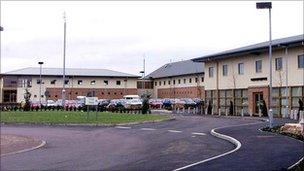Glasgow offers alternative to child detentions
- Published

Children have been detained at immigration removal centres such as Yarl's Wood
The predicament of children held at immigration removal centres was again highlighted last month when the closure of the family wing at Yarl's Wood in Bedfordshire was announced.
A month earlier, a review of how asylum seeker families with children are treated was launched, with Immigration Minister Damian Green pledging that alternatives to removal centres would be examined. One such option has been running in Glasgow.
Packing up her kitchen utensils and collecting her children's toys into cardboard boxes, Rubina cannot stop smiling.
Having spent the last four months under threat of being sent back to her native Pakistan, the 40-year-old mother of three has won a temporary reprieve. Her application for a judicial review of her asylum claim has been accepted.
So now she is being moved out of the spacious but poorly furnished flat where she and her young children have lived for the last 16 weeks, and back to the flat they used to occupy on the other side of Glasgow.
"I am almost ready to go," she says brightly. "I am really so happy, so are the children."
Not so long ago, Rubina (not her real name, which she would not give for fear of jeopardising her case) would have spent these past few anxious weeks locked up with her children, waiting to be put on a plane home.
But since last year, there has been another option for dealing with failed asylum families in Glasgow: the Family Returns Project, devised by the city council in conjunction with the UK Border Agency.
Under the scheme, Rubina and the two other families currently in the project live in open accommodation, have their own front door and can come and go as they please.
But it has not met with total approval from Rubina. She says she is unfamiliar with the area in which she has been housed and says she feels cooped up in the flat and under constant pressure from the Home Office and social workers, to whom she has to report regularly.
"I think this project is a waste of money," she says.
"For me this is like being in detention," she says glumly.
However, for those who have passed through one of the UK's immigration detention centres, like 10-year-old Zahir, the open-project is a big change for the better.
Zahir, his mother and elder brothers - who are all from Pakistan - lived in the flat next door to Rubina's flat for several months earlier this year. Before that, they spent five days at the Yarl's Wood immigration centre in Bedfordshire.
He said of his time at Yarl's Wood: "I would run around the courtyard and they would tell me, 'don't play here, go back to your room'. There was nothing to do there."
When the family was moved into the open project, Zahir was able to keep up with friends and go to school on a regular basis.
Last year over 1,000 children were detained with their parents in immigration centres, according to Home Office figures - a situation described recently by Deputy Prime Minister Nick Clegg as "a moral outrage."
A Home Office review is currently under way after the coalition pledged to end the practice of child detentions.
'Humane'
The Glasgow project is one of the alternatives being considered.
"This is without doubt much, much better," said Phil Smith, who works at the Unity asylum drop-in and advice centre in Glasgow.
He said: "I have visited children behind bars - it's just horrific."
John Donaldson, head of immigration and emergency services at Glasgow City Council, last year described the project as "the most humane way to return families to their own country".
He said the aim was to help "the mindset of moving towards home".
Yet between June 2009, when it was first established, and June 2010, only 11 families were given accommodation in the Family Returns project.
Scotland has more than 2,000 asylum seekers.
- Published21 July 2010